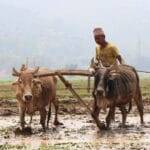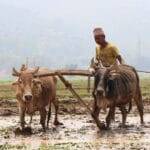Main Points In Hindi (मुख्य बातें – हिंदी में)
- किसानों की मांग: दक्षिण के पांच राज्यों के किसान नेताओं ने केंद्र सरकार से आनुवंशिक रूप से संशोधित (जीएम) फसलों के लिए राष्ट्रीय नीति (GM Crop Policy) तैयार करने से पहले देशभर में व्यापक परामर्श करने का आग्रह किया है।
- सुप्रीम कोर्ट का निर्देश: यह बैठक सुप्रीम कोर्ट के हालिया आदेश के संदर्भ में आयोजित की गई थी, जिसमें सरकार को जीएम फसलों पर एक राष्ट्रीय नीति के लिए सभी हितधारकों के परामर्श को आवश्यक बताया गया है।
- जीएम फसलों पर विचार: किसान नेताओं ने जीएम बीजों और जीवों की आवश्यकता पर सवाल उठाया और यह सुझाव दिया कि सरकार को जैव सुरक्षा और सामाजिक-आर्थिक पहलुओं को ध्यान में रखते हुए एक संरक्षित नीति विकसित करनी चाहिए।
- आधुनिक जैव प्रौद्योगिकी की आलोचना: किसानों ने आधुनिक जैव प्रौद्योगिकी को एक महंगा और असुरक्षित विकल्प करार दिया है, जबकि उन्होंने बीज कंपनियों को बौद्धिक संपदा अधिकार देने का विरोध किया है।
- पारदर्शिता की मांग: किसान नेताओं ने स्पष्ट किया कि नीति विकास की प्रक्रिया में पारदर्शिता और व्यापक चर्चा होनी चाहिए, ताकि किसान समुदाय को सही जानकारी और अधिकार मिल सके।
Main Points In English(मुख्य बातें – अंग्रेज़ी में)
Here are the main points from the article regarding the farmers’ leaders from southern states calling for consultations on genetically modified i.e. GM crop policy:
- Call for National Policy Consultation: Farmers’ leaders from five southern states urged the central government to conduct extensive consultations across the country before formulating a national policy on genetically modified crops.
- Supreme Court Directive: The meeting of over 40 farmers’ unions was organized in response to a recent Supreme Court ruling that mandated the government to prepare a national policy on GM crops with input from all stakeholders, including farmers and state governments.
- Opposition to GM Crops: The representatives expressed their opposition to the need for GM seeds and organisms, citing concerns about biotechnology being a costly and unsafe approach that does not align with the farmers’ interests.
- Demand for Inclusive Consultation Process: The farmer leaders emphasized the importance of including state governments in the consultation process and highlighted the necessity of addressing biosafety and socio-economic considerations when developing the policy.
- Concerns over Intellectual Property Rights: The farmers opposed granting intellectual property rights on seeds and genetic material to biotech companies, highlighting issues of control over agricultural systems and the consequences of prior failures with GM crops, such as Bt cotton.
Complete News In Hindi(पूरी खबर – हिंदी में)
दक्षिण के पांच राज्यों के किसान नेताओं ने केंद्र सरकार से आनुवंशिक रूप से संशोधित फसलों पर एक राष्ट्रीय नीति तैयार करने से पहले देश भर में व्यापक परामर्श करने को कहा है।
विभिन्न दक्षिणी राज्यों के 40 से अधिक किसान संघों के प्रतिनिधियों ने आनुवंशिक रूप से संशोधित फसलों के विभिन्न मुद्दों पर चर्चा करने के लिए रविवार को मुलाकात की।
यह बैठक हाल ही में केंद्र सरकार को दिए गए सुप्रीम कोर्ट के निर्देश की पृष्ठभूमि में आयोजित की गई थी, जिसमें किसानों और राज्य सरकारों सहित सभी हितधारकों के परामर्श से जीएम फसलों पर एक राष्ट्रीय नीति तैयार करने के लिए कहा गया था।
सम्मेलन के अंत में एसोसिएशनों ने कई प्रस्ताव पारित कर कहा कि देश को जीएम बीजों और जीवों की जरूरत नहीं है। उन्होंने कहा कि शीर्ष अदालत ने केंद्रीय पर्यावरण, वन और जलवायु परिवर्तन मंत्रालय को एक राष्ट्रीय नीति विकसित करने का आदेश दिया था
सभी हितधारकों को शामिल करते हुए सार्वजनिक परामर्श के माध्यम से जीएम फसलें।
“हम अदालत के इस आदेश का स्वागत करते हैं। हम किसानों को बायोटेक समर्थकों के झूठे वादों और अल्पकालिक प्रलोभनों से बचाने के लिए एकजुट होकर काम करेंगे। तेलंगाना राज्य किसान कांग्रेस के अध्यक्ष अन्वेष रेड्डी ने कहा, एमओईएफ और सीसी को नीति विकसित करने के लिए व्यापक और दृश्य परामर्शी प्रक्रियाएं अपनानी चाहिए।
किसान नेता चाहते थे कि केंद्र सरकार परामर्श प्रक्रिया में राज्य सरकारों को भी शामिल करे।
“हम गंभीर आशंका व्यक्त करते हैं कि सरकार जीएम फसल संवर्धन और सुविधा नीति तैयार करना पसंद करेगी। इसके बजाय, हम सरकार से जैव सुरक्षा और जैव सुरक्षा के साथ-साथ सामाजिक-आर्थिक विचारों को संबोधित करते हुए एक जैव सुरक्षा संरक्षण नीति तैयार करने के लिए कह रहे हैं, ”उन्होंने कहा।
सम्मेलन द्वारा अपनाए गए प्रस्तावों में से एक में आरोप लगाया गया कि आधुनिक जैव प्रौद्योगिकी एक महंगा और असुरक्षित फॉर्मूला है। “हमारी कृषि प्रणालियों पर कब्ज़ा करने और उन्हें नियंत्रित करने के लिए, झूठे वादों के साथ इसे आगे बढ़ाया जा रहा है। हम इसे अस्वीकार करते हैं,” इसमें कहा गया है।
किसान बीज कंपनियों को बीज और आनुवंशिक सामग्री पर बौद्धिक संपदा अधिकार (आईपीआर) सौंपने का भी विरोध करते हैं।
“सुप्रीम कोर्ट के आदेश में स्पष्ट रूप से कहा गया है कि परामर्श प्रक्रियाओं के बाद नीति तैयार की जानी चाहिए। पिछले 10 वर्षों में, हमने देश और किसानों पर बिना किसी परामर्श के कानूनों को थोपते हुए भी देखा है, ”अन्वेष रेड्डी ने कहा।
अविभाजित आंध्र प्रदेश के पूर्व कृषि मंत्री वड्डे सोभनाद्रेश्वर राव ने कहा कि बीटी कपास की विफलता से सरकार को कोई भी नीति बनाने में मार्गदर्शन मिलना चाहिए।
Complete News In English(पूरी खबर – अंग्रेज़ी में)
Farmer leaders from five southern states have urged the central government to conduct extensive consultations across the country before developing a national policy on genetically modified i.e. GM crops. Representatives from over 40 farmer unions in various southern states gathered on Sunday to discuss various issues related to GM crop policy.
This meeting took place against the backdrop of a recent directive from the Supreme Court, which called for the creation of a national policy on GM crops in consultation with all stakeholders, including farmers and state governments.


At the end of the conference, the associations passed several resolutions stating that the country does not need GM seeds and organisms. They emphasized that the Supreme Court had instructed the Ministry of Environment, Forest and Climate Change to develop a national policy through public consultations that include all stakeholders.
“We welcome this court order. We will work together to protect farmers from false promises and short-term incentives offered by biotech supporters,” said Anvesh Reddy, president of the Telangana State Farmers Congress. He urged the Ministry to adopt comprehensive and transparent consultation processes for policy development.
Farmer leaders expressed their desire for the central government to also include state governments in the consultation process. They voiced concerns that the government might favor a policy that promotes GM crops instead of addressing biosecurity and socio-economic considerations through a protective biosecurity policy.
One of the resolutions from the conference claimed that modern biotechnology is an expensive and unsafe approach. It stated, “It is being pushed forward with false promises to capture and control our agricultural systems. We reject this.”
Farmers also opposed giving intellectual property rights (IPR) to seed companies for seeds and genetic material. Anvesh Reddy noted that the Supreme Court clearly stated that policy should be developed after consultation processes. He pointed out that over the past decade, the government has imposed laws on the country and farmers without consultation.


Vadde Sobhanadreshwar Rao, a former agricultural minister of undivided Andhra Pradesh, suggested that the failures of BT cotton should guide the government in formulating any new policy.




